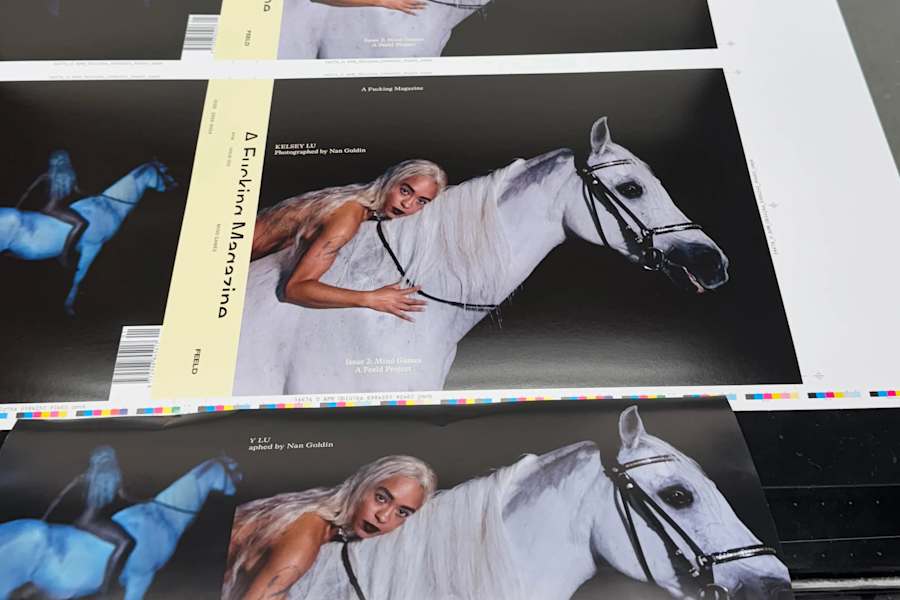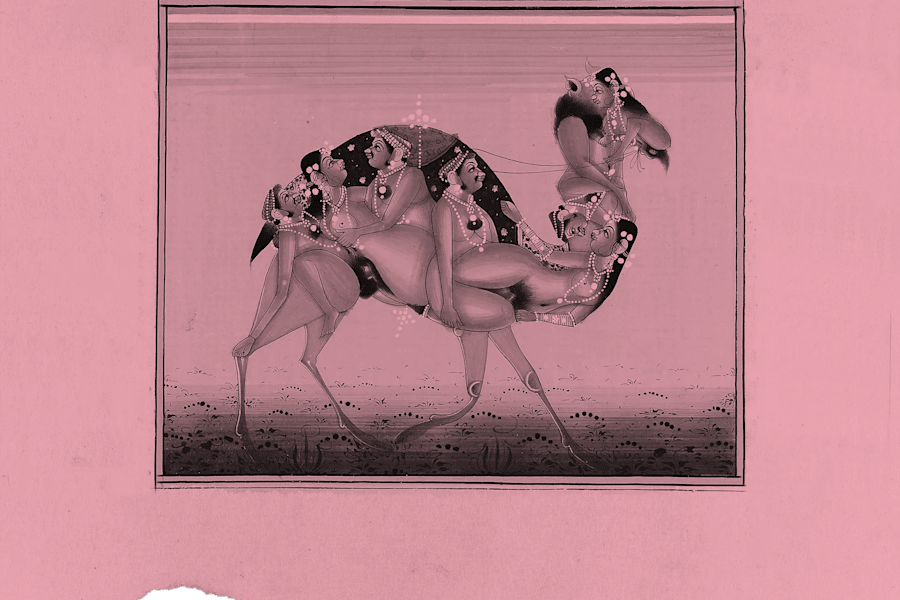
Moral Support is a column devoted to a thorny ethical question—a place where we invite contributors to respond with their own interpretations. For our very first edition, we wanted to know: What is the difference between loyalty and commitment?
Asking our three contributors this question was easy. Answering it myself was another story. I immediately realized two things: 1) I had never stopped to examine the difference and 2) that may be the problem. Because what if employing the two is necessary for intimacy and fulfillment, for a life impressed by the strength of how much weight it can carry, and could that be the very thing I was missing?
And yet, parsing the differences, to me, felt like moving around without my glasses, aware of general shapes and textures but unable to provide the specifics, arms outstretched, feeling my way through, at my most vulnerable and exposed. I'll get there eventually. Was this the time?
Better then for me to talk about what the values have in common. (They are sisters, not twins.) They are proximate movements and similar vulnerabilities, an uncertainty into whether another party will hold up their end of the deal. Loyalty and commitment both demand attention and effort, require a level of maintenance and forged agreement. Neither value accommodates passivity—they demand that you feel, you try, you do.
Thus, loyalty and commitment are similarly frightening. There is always, of course, the possibility it will all go spectacularly wrong, that loyalties expire and commitments break. Your efforts are lost in translation. You fall short. You're mismatched. You're disappointed. We say to each other, "it happens!" when something goes wrong, but the truth is: it keeps happening. Things go wrong all the time. We learn lessons later than we'd like; we realize our mistakes far too late to apologize.
Here, we try to consider the alternative. In this section, three writers—Hanif Abdurraqib, Sarah Thankam Mathews, and Mimi Zhu—approach the question from their own ways of seeing. Mathews revisits her younger conceptions of attachment, finding that the intimacy of one without the other is dwarfed by the fullness of true belonging. Zhu calls us to think about how these actions can bind us towards better futures, both in our relationships and our systems. Abdurraqib runs towards devotion, that nirvana reached when commitment and loyalty become an enduring curiosity. Perhaps it's better to think about them neither as static acts, or opposing concepts, but as two steps on the same journey, one foot in front of the other, to the place we want to be.
— Jazmine Hughes
Hanif Abdurraqib
Run to the Feeling
I cannot speak for all runners, but I know my own window of discomfort well—the stretch of time between the starting point and whatever point where the run becomes comfortable for you, when the brain understands what the body is doing. I love my routines as I love any return. I love my routines as I would love a person I miss walking back through a door they walked out of just hours earlier. I love my routines as I love the burgundy flowers I cannot name which, as we speak, have fought their way beyond the unkempt weeds of my backyard for a fourth year in a row, bending towards the sun like they’ve woken up from a good dream. And so, yes, I say this to say I love my daily runs, which is also to say I have built a routine within the routine, I have found a label for what exists beyond the discomfort: too long to stop, too far to go back. It’s a mantra, a promise, something that clicks my brain and body into place. It’s simple. I’ve been going for too long to stop, and by virtue of going this long, I am too far away from my house to turn around.
Both of these things are untrue. One can always stop any forward motion. One can always return to the safer place, or the easier place, or the place that promises something better, or simply something different than where they are. But if you tell yourself something for long enough, you will become it.
I was skeptical of promising I’d love someone until I was dead, even when I was doing it. The structure of traditional wedding vows, in extremity, in vibrancy of language and commands—this is one way to consider commitment. It is to make a pact in front of people who love you (individually and, in some cases, collectively,) and say that you will love each other until the love is severed by death itself.
Loyalty, to my ear, heart, and mind, is a by-product of commitment. A less romantic tendril of commitment’s existence. Commitment is the demand or declaration, while loyalty represents the umbrella of less-showy actions one must take to live up to the series of demands and declarations. I brush hands with an attractive stranger at a party in a city that is not the city I live in with my beloved, and I count the seconds when my eyes lock and linger with the stranger’s, knowing there is a threshold that comes with unspoken communication. That is loyalty, in a sense. A sibling or an in-law or some other relative frustrates me, and in silence, I make our home comfortable for them to have a long stay. Loyalty, in another sense.
But here is where my skepticism arises, knowing what I do about love and time and the internal self. What do we make of the fact that before our actual deaths, the final show, the thread of our lives stretched to its breaking point, we endure several, smaller deaths, sometimes without awareness? Parts of our childlike selves may harden with time, with loss. The world may make us more cynical, more numb. Any promise to love until death has, underneath it, the whisper of the other question: which death?
When my marriage ended, people told me the things people tell you in that moment: “it’s not a failure.” And of course, it isn’t. Commitment is also understanding that you aren’t just promising to love one version of a person, you’re promising to love versions of them that you can’t even predict. You will become versions of yourself that you cannot even fathom, and somewhere, despite that, harmony must be continually found.
Today, I like to think the immediate feeling(s) of first falling in love can be prolonged, stretched until they are entirely malleable, capable of being spread out over months, years, a life. This is a newer development, one I’ve attributed to a growth in curiosity and patience as I’ve aged. I want to know everything about you, the ever-changing and ever-evolving you. I want to take time with every detail. I want the story of how your mother laughed to last an hour. I want to hear about your elementary school enemies in such great detail that they become my own. I would like, now, to wake up every morning, and ask the question, do I choose this person today with the same velocity of affection that I chose them yesterday? And to have the answer be yes, because there is so much I haven’t discovered that I can love about them.
This, I think, is commitment to me now. Which is, in so many ways, routine. I am loyal to my curiosities, and I impose those curiosities upon my commitments, and I want to know how to love you well; I want to show you how to love me well. Not promised until death, I suppose, though given the unexpected arrival of endings, it may well be. But for a good, long time, in which our shared knowing of each other hums on its own, and propels us forward without our knowing it.
And this is the trick. Yes, the lie is that I’ve been going too long to stop, and I am too far away from home to return. But I am also reaching for what happens just beyond, on most of my runs. When the brain clicks into place and I forget that I am even in motion. The world itself slows down, and its vibrant colors pour onto the otherwise dull sidewalk. The geese, my occasional rivals, crane their long necks towards me in disapproval, but then their faces catch the sun and even they are beautiful in the moment.
I am moving towards something unknowable. I don’t have any idea when I will stop, and everything that surrounds me is charged with a beauty that drips slowly onto the earth around me. That’s what I’m chasing. That is devotion. I am going nowhere I can name, but there is beauty along the way, and if you are not alongside me, I hope to tell you about it when I see you. And maybe you’ll come along next time, and every time after.
Sarah Thankam Mathews
Both Verb and Feeling
Due to my family’s choices, circumstances, and migrations, I attended high school in three different countries. Each time I arrived in the chaotic middle of a school year or semester. This, as you may imagine, affected my young self’s experiences with attachment, and attachment is, ultimately, the cartilaginous endoskeleton present within loyalty and commitment alike.
During my formative experiments with romance, I successively pined, latched, labored with the half-life of heartbreak in relationships I did not wish to end but also did not wish to be transnational. I attempted ole gal Yeats’ counsel to never give all the heart, practiced a style of loving that mirrored my immigration status: as long as I could, I would stay, but could make no promises. I was interested, in short, in trying to have love live alongside non-attachment.
What this looked like in practice: a painful breakup I instigated with a high school boyfriend whose mother I loved so tenderly that I went to the living room and kissed a framed picture of her before sadly letting myself out of the house. I listened to my first girlfriend, an artist and musician, explaining that she wanted to stay together while we went to colleges in different states but wondered if by doing so she would miss out on various kinds of hedonic freedom. “What if I want to go to like, a lesbian orgy at ____” she asked, eyes wide with sadness, and I icily retorted, “Well, let me not keep you from any orgies,” ended things, then wept all night. Me in my twenties, writing someone a deeply romantic, genuinely intended love poem that ended, “I’m still here, until I’m not. And now, I’m still here.” (A moment of silence for this accidental emotional terrorist, Jesus, Astaghfirullah.)
I think back to the (mostly) sweet people I was involved with, and am torn between a rueful compassion for all involved and a sense of the embarrassing comedy of who we were but are no longer. The mildness of my reaction is informed by how young we all were, and by knowing the eventual happiness most of them have found.
Who I was then was somebody with great capacity for loyalty and a terror of commitment. A feeling of disloyalty was often present within my loyalty, a shimmering oily runoff in a stream of genuine love and goodwill. This was not just because of the non-attachment, but because I was able to see people’s faults quite clearly even as I loved them, and in my hatred of my own faults found those of others hard to metabolize. I wanted to love well, but also be discerning in who I let into my life with any kind of longevity, having learned very young that who you let into your life can be what forms your life.
And for all the aforementioned terror, I wanted commitment, so deeply. I thought it was a beautiful and frightening thing. I wanted it from others, yes, but mostly I wanted to offer it truthfully, from within myself, like some pure and rare and lasting crystal.
There are those that say loyalty is a feeling and commitment is a verb. I have come to believe that both are both; they live nestled within each other. You can be loyal, to a degree, without commitment. I have. You can have disloyalty and loyalty emulsified and present within deeply loving commitment. To be loyal can be something you feel, but it is also, incontrovertibly, something you are and do. To be loyal as an act is to move with the protection of another’s wellbeing in mind—to care for it, to honor its precarity.
Commitment, meanwhile, is broadly understood as an act, a choice, a mutually-held promise, a contract with bespoke terms, and it is all these things, yeah sure, but it also is a feeling, by which I mean, a knowledge that lives within the body. When I look at the people I’ve committed to, I feel within me a sense of something I can’t quite truthfully only call loyalty, which is above all else about an orientation towards another person. What I sense in these moments is the feeling of a mutually constructed belonging, a fine and strong thread spun out into a horizon I cannot see.
In love and politics, a feeling is all very well and good, but even in our insufferable age of vibes it is in action that anything is made real. For myself, I learned the acts and art of loyalty and commitment through fumbling practice, through the examples of others I admire, through asking myself how I wanted to be and live, and through the simple luxuries eventually afforded to me, like a life less buffeted by the vagaries of money and migration. It is not lost on me that I felt more able to make any kind of romantic or platonic commitment after I received a green card. When I wrote I’m still here, until I’m not I was being an emotional idiot, but also expressing an aching fact of my life. Attachment, like anything else, lives in and is formed by the material world. This has never not been true.
Mimi Zhu
Deepening our Loyalty into Commitment
I used to take pride in being fiercely loyal, following the people I love without questioning how I felt about them. Sometimes, for loyalty’s sake, I would enable their mistakes or misguided behavior, without critique or accountability. I grew up being taught that when you love someone, you stick by them no matter what. But what happens when that person enacts harm, or does something you do not agree with? What are the conditions of unconditionality?
I see loyalty as a deeply admirable quality. I see it as a desire to maintain and prolong our connections. It is a devotion to a relationship, and an energy worth deepening. It is a full-bodied sensation that needs to constantly be generated into action.
I am learning that I can be loyal without appeasing or enabling somebody’s mistakes. I can be loyal to someone when I stick by their side and also want them to do better. Sometimes, supporting someone is being able to critique them with compassion. I would want the same criticism.
That action is commitment. Commitment comes with questions and knowing that we are capable of mistakes, wrongdoings, and most of all, change. We are capable of inheriting harm and re-enacting it, and we are also capable of forgiveness and reform. An unquestioning avoidance might seem like loyalty, but ignores the vital and ever changing core of the person you are in a relationship with.
What is deeply rooted within us, the often toxic systems that we are trying to dismantle, cannot be flushed away overnight. It takes time to unlearn and relearn, and that in itself is a commitment. When we are committed to something, whether a relationship, a movement, an organization, or a change, we cannot simply appease each other for the sake of loyalty. We must be steadfast in honoring the ebbs and flows of our current conditions, ourselves and our communities—none of which are separate—moving alongside them, no matter the obstacles we might face.
What is loyalty without commitment to the changes and challenges that come along the way? What is loyalty without acknowledging that we are imperfect? Commitment is looking challenges in the eye and being courageous enough to accept them. Especially when we are committed to challenging conventional ways of acting, we must not be nervous in the face of an obstacle. We must bring our honesty, reflection, and a sense of trust for and with each other. None of these traits are encouraged within late capitalist society, and yet, in these challenging times, they seem to be some of the most urgent requirements of all.
We are not exceptional, nor can we ever be perfect. We make mistakes, we change constantly, and therefore, we must be committed to seeing through those changes in order to enact change. We must always be committed to changing, together.


